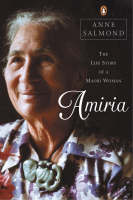Dame Anne Salmond: anthropologist, professor, environmentalist, writer, eloquent speaker, and still frequently asked to refute the opinions of the same old ex-politicans giving their ill-informed reckons about te ao Māori and its place in New Zealand. A tiresome task for someone who has spent their lifetime learning as much as possible about tikanga Māori and has literally written several books on the subject, so it was a treat to listen to Eruera Tarena engage Dame Anne in conversation.
Eruera Tarena started off the session by asking Dame Anne to expand on their shared connections to his namesake, ancestors and prominent elders Eruera and Amiria Manutahi Stirling, inspiration for several books. While on a scholarship in the States she was often asked to speak about New Zealand and realised she didn’t know an awful lot about some aspects of our country, and therefore resolved to learn te reo Māori on her return. This she did, and it was while studying the subject at university that she met the Stirlings, hitting it off immediately with Amiria. A strong friendship ensued, involving a lot of storytelling and singing on Amiria’s part, and a gradual mentorship in te reo and tikanga Māori from Eruera Stirling. Upon the completion of Dame Anne’s masters, Eruera declared that “the marae is the university for you now." This involved what sounds like two years of fun road trips in their little blue VW to different marae, soaking up the knowledge of kaumātua around the country and hearing about Amiria’s life as they drove.
I learnt as much through the skin as through reading or recording. When you talk to someone for a year about their life, marvelling at the stories you’re hearing, your lives become mingled. It’s a very intimate thing to do, and a huge gesture of trust to let your life be filtered through someone else’s pen.
Through these talks came the book Amiria: The Life Story of a Maori Woman, and later Eruera: The Teachings of a Maori Elder.
Tears of Rangi: Experiments Across Worlds, Dame Anne Salmond’s most recent book, focusses more on the meeting of two cultures in early New Zealand history, bringing a more nuanced view to a time often written about solely as one of conflict. Dame Anne said in response to those that see European arrival as an enlightening influence on “savage” Māori that “they obviously don’t know much about European history”, referring to the frequent conflict in Europe at the time.
Regarding climate change and how we can come together to preserve our waterways and environment for future generations, Dame Anne spoke about the exploration in her book of how we can expand our ways of thinking of living with waterways — especially understanding that these are living system on which we rely, and therefore the necessity of restoring our rivers and springs. Some of this thinking emerged from work on a local eco-sanctuary and seeing the positive growth from that effort, seeing birds and native plant species return.
Tears of Rangi is about first encounters, asking deep questions about what’s the potential for us and our future. It’s an attempt to round off what I’ve been thinking about for a lifetime, to indicate some possibilities of what we can do together. I think we can do a lot. We’re trying, but we could do more.
The session closed with a tauparapara beloved of Eruera Stirling, speaking of what binds us and the coming together of spirits.
Kia whakarongo ake au
Ki te tangi a te manu neiA te MātūīTūī, tūī, tuituiaTuia i rungaTuia i raroTuia i wahoTuia i rotoTuia i te here tāngataKa rongo te pōKa ronga te aoTuia i te muka tāngataI takea mai i Hawaiki-NuiI Hawaiki-Roa, i Hawaiki-PāmamaoOti rā me ērā atu anō HawaikiTe hono i wairuaWhakaputa ki Te WhaiaoKi te whaiaoKi Te Ao Mārama
Tihei mauri ora!
Find out more
- Find titles by Dame Anne Salmond
- Our WORD Christchurch 2018 page
- WORD Christchurch festival programme





Add a comment to: Anne Salmond – Tears of Rangi: WORD Christchurch Festival 2018